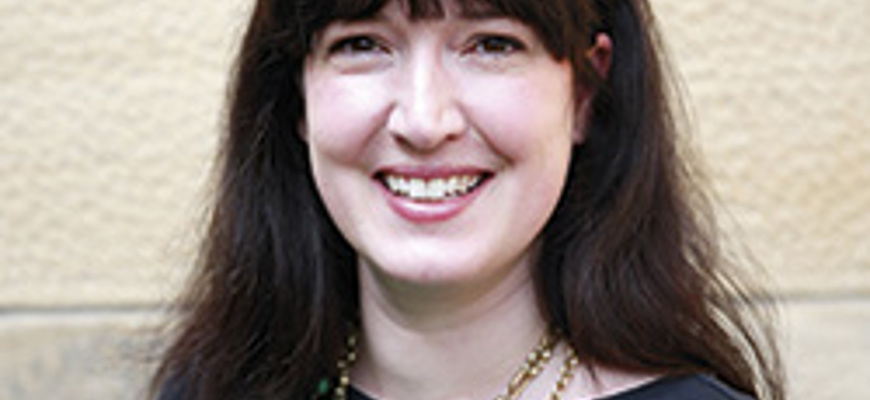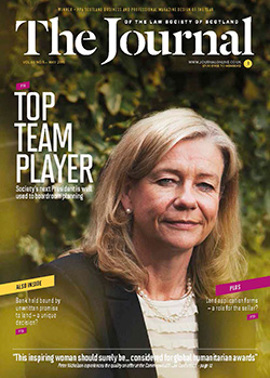The sky's the limit

Congratulations on Skyscanner winning the Barbri International In-house Legal Team of the Year Award at the Scottish Legal Awards 2015. How was the event and what did this mean to you and your team?
It was a fantastic evening and very good fun. It was great for the team and a real recognition of all their hard work over the last few years.
How many are in your in-house legal team and how is it structured? How much input do you have on business strategy and governance?
We have seven in-house lawyers in our team, including colleagues in Singapore and China, and a trainee. We have quite a flat structure, with the team working on a variety of issues rather than being restricted to particular work streams. I have had input on business strategy and governance since I joined, but the areas I work in are becoming more strategic all the time. I have now also taken on a public and regulatory affairs role, which involves monitoring and influencing broader industry issues, and play a leading role in our merger and acquisition (M&A) activities, so I am kept busy!
What is a typical working day for you?
There is no typical day for me – it varies from day to day depending on whether I am in the office or travelling, whether there are any pressing industry issues, or ongoing acquisitions and deadlines for communications. The only constantis the pace and the fact it tends to be pretty interesting.
What motivates you on a Monday morning?
Being part of an exciting business in an exciting industry. Skyscanner has grown at such a pace, plus it is fascinating to be part of an internet company as the law evolves globally in different jurisdictions. I am learning all the time, and that keeps me motivated.
Where do you come from, and what was the career path to your current position?
I was born in Johannesburg, South Africa, but largely grew up in Newbury, Berkshire. I studied law at Westminster University, and then did the Bar Vocational Course at the Inns of Court before being called to the bar at Lincoln’s Inn. I didn’t really fancy the family law direction I was headed, and had enjoyed summer work in the legal team at Panasonic, so decided to go in-house. I worked for a number of proprietary and open-source software companies, and spent some time in a commercial sales role, before joining Wolfson Microelectronics. I joined Skyscanner two years ago to build up a legal team. I am English law qualified and have an LLM in IP from Edinburgh University.
What was the biggest change for you when you moved in-house? What do you really enjoy about working in-house?
I have always worked in-house, so I didn’t experience that shift. I love the variety of work and seeing the application of the law in practice rather than in abstract. I enjoy the challenge of legal problem solving, and you need a particular mindset and to be able to juggle several items at once.
In a time of growth and constant change, our goals as a team move all the time. New challenges arise constantly, such as new venture capital investors and a new company in China.
Has your organisation experienced any major change recently?
Given the rate of growth of Skyscanner and our M&A activities, things are regularly changing. We’re also adding product features, such as hotels, which bring new legal and policy issues with them.
What is the most unusual work request you have received?
Just after I joined, I was asked by our marketing area to sort out an issue involving a giant suitcase (with video screens) that had been commissioned. It was great, but unfortunately was too big to go through most doors! It now sits in our Edinburgh office.
What makes a good in-house lawyer? What’s your advice for young lawyers who want to consider an in-house career?
The ability to multitask and stay practical. Anyone can interpret the law technically, but the answer has to work. In-house lawyers should be enablers and not barriers, and must be able to communicate and adapt their tone and style depending on their audience. Commercial nous is needed, as is the ability to see the bigger picture and stay commercial.
I would encourage anyone going in-house to seize the opportunity to work across different fields and think about the industry they are most interested in at the start. You can change industry, but it is not always easy – and try to choose an exciting industry that is on the up! It also helps if you have a passion for what you do.
What do you look for when you seek external legal advice? How do you see the in-house/external legal relationship changing?
I look for good communication and delivery on time. For me, the use of external firms should be the exception and not the rule. My team is there to provide the service themselves and understand the business better than a firm can. We engage firms where it is particularly niche or unusual, in a difficult jurisdiction, or due to capacity issues. We tend to look for external validation of our own answers so as to add value, rather than it being an open ended exercise. We always look for externals who care, fit in and are part of the team: sharing similar personalities always helps us to work well together.
There has been a huge shift in attitude over the last decade – previously, I think in-house roles were looked down on by those in private practice, but this has changed. In-house work is now seen as an exciting option.
High-quality work tends to be done in-house now, with firms being used to doing the more day-to-day things. In-house teams rely less on external advice than they used to, and firms need to work much harder to win work and build relationships with in-house teams.
What are the current hot legal topics in your sector, and how does the future look for in-house lawyers in your industry?
There is a lot of focus on the digital single market, and that will inevitably impact internet companies. There is also a focus, as part of that, on the standards to be adopted by comparison sites within the EU, as well as data ownership and data use rights. The ongoing competition investigations into online hotel bookings are drawing to a close, but there remains a general focus on the online market.
The future is bright for in-house lawyers in the industry, and regulation in the internet environment is only likely to increase.
Does Scottish legal education and training provide the necessary skills for working in-house in your organisation?
We have a mixture of Scottish and English solicitors (and one Chinese lawyer). Legal education in the UK provides many of the skills for working in-house at Skyscanner.
Our lawyers have a good legal grounding and understand the law, possess good analytical skills and know how to apply these in-house. I found the English Bar course very valuable, with its practical training, and I learned a lot about communication, how to break issues up into chunks and apply the law.
How do you think in-house lawyers today are perceived among the wider legal profession?
We are valued – there is much more interest in the in-house profession, and I think the strategic commercial work undertaken as part of an in-house role intrigues those who haven’t had such a role. I’m often asked what that part of the job is like.
You were one of the speakers at the Faculty of Advocates’ World IP Day 2015 Edinburgh event. How important is IP to your business?
IP is hugely important to Skyscanner – it forms the basis of much of what we do. There is copyright in the code we use, and IP rights in data is a current topical subject. Traditional IP, when translated to the internet, can bring its own challenges, so it is not a settled area of the law. A lot of thought has to go into the current and future law and its impact on our business. Brand is very important to us as an internet company, and protection is critical for our trade marks and domain names.
What keeps you busy outside the office?
My husband, three children and a golden retriever dog. Outside of work, I try to spend as much time as I can with my family, and we all love to head up north and do some walking near Aviemore or on the west coast.
What one thing would you take with you to a desert island and why? What would you put in Room 101 and why?
I would like to take my family with me (if they count as one thing), or a Kindle with a sustainable power supply so I always have something to read.
Rude and arrogant people and cronyism are two things that I dislike, and which can really slow down progress.
In this issue
- Sham marriages v Sham interviews: which is the greater evil?
- A trusts law for the modern era?
- When cash just isn't good enough
- Un voyage en vaut la peine*: SYLA does France
- SYLA ends season on a high
- Appreciation: John Henderson
- Reading for pleasure
- Opinion: Mohammed Sabir
- Book reviews
- Profile
- President's column
- People on the move
- Application forms: should the seller adjust?
- When sharing matters
- After the launch
- Game of strategies
- Broken promises
- Charity legacies: the 10% conundrum
- Another "Whose money?" case
- Barrister barred
- Rearranging the family ties
- Belief in the system
- Living by the code
- The sky's the limit
- Unfinished business
- Law reform roundup
- Appreciation: Joseph Beltrami
- LBTT: what does it mean in practice?
- For those of a certain age
- Claims: trending?
- Ask Ash
- A man for all reasons
- The "TER approach"






